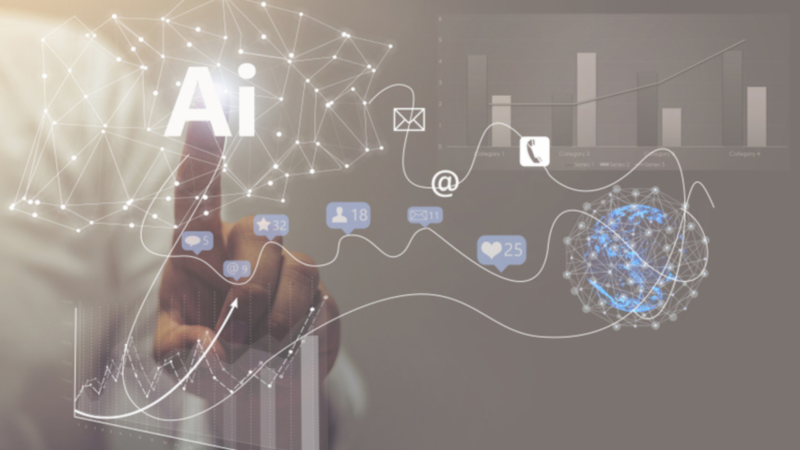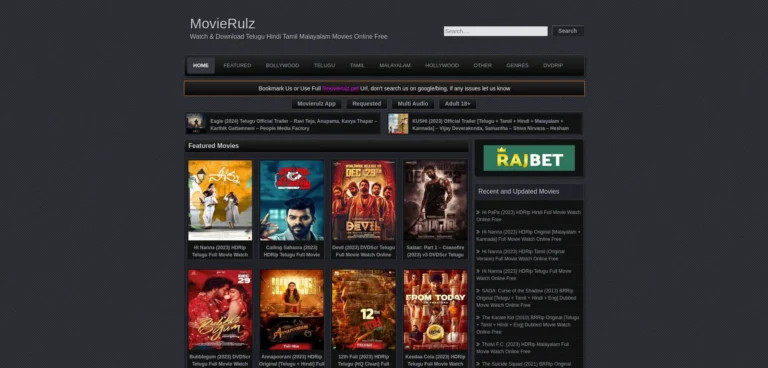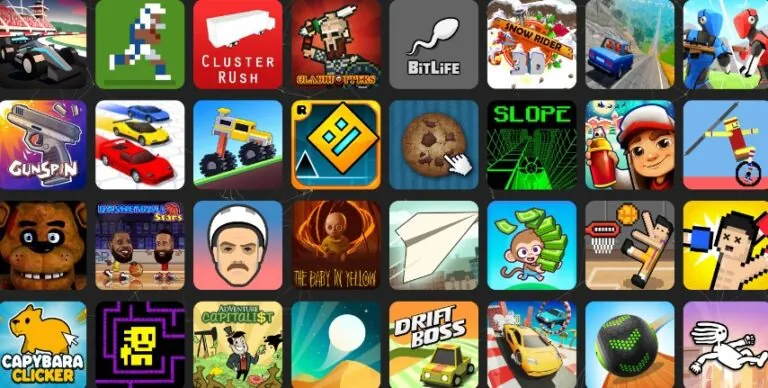Finding the right AI chatbot can be a significant step toward improving your daily interactions, whether for personal use, professional tasks, or business operations. With so many options available, it’s important to know which alternatives to ChatGPT stand out. This article provides a detailed look at the top AI chatbots as proper ChatGPT alternatives.
Table of Contents
ToggleThese Are The Best ChatGPT Alternatives
1. Google Bard
| Developer | |
| Primary Use | Conversational AI and information retrieval |
| Integration | Google services and products |
| Languages Supported | Multiple |
| Availability | Global |
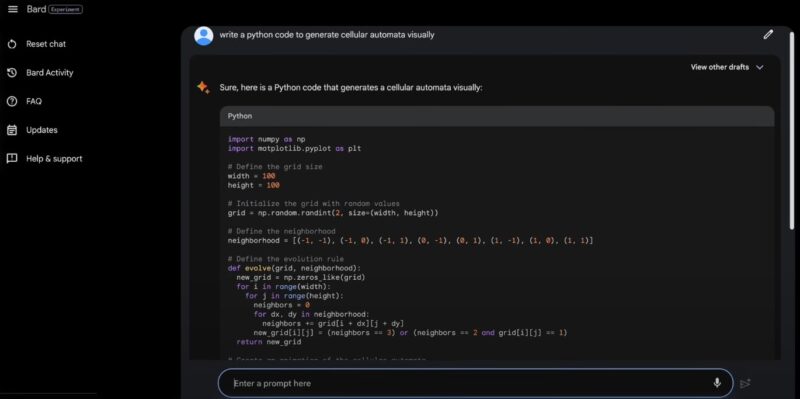
Google Bard is an advanced conversational AI developed by Google, designed to provide users with detailed and accurate responses. It leverages Google’s extensive database and search capabilities to deliver up-to-date information, making it an excellent tool for those seeking reliable and comprehensive answers.
One of the main strengths of Google Bard is its integration with Google services, allowing for seamless access to various functionalities. This AI chatbot is particularly useful for those who rely heavily on Google’s ecosystem, as it can enhance productivity by providing quick answers and performing tasks within Google’s suite of tools.
In addition to general information retrieval, Google Bard is capable of understanding and responding in multiple languages, making it accessible to a diverse global audience.
It is the main rival to OpenAI and one of the best ChatGPT alternatives.
Pros and Cons
| Pros | Cons |
|---|---|
| Deep integration with Google services | Limited to Google’s ecosystem |
| Accurate and up-to-date information | May not be as flexible for creative tasks |
| Supports multiple languages | Dependent on internet connectivity |
| User-friendly interface | Potential privacy concerns |
2. Jasper
| Developer | Jasper AI |
| Primary Use | Content creation and marketing |
| Integration | Various marketing tools |
| Languages Supported | Multiple |
| Availability | Global |
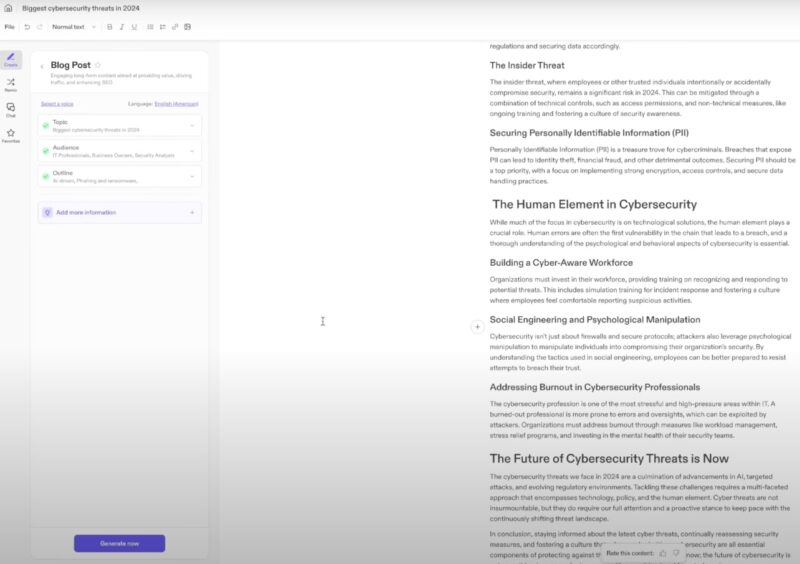
Jasper, formerly known as Jarvis, is a specialized AI writing assistant aimed at content creators, marketers, and businesses. It excels in generating marketing copy, blog posts, social media content, and more, making it a valuable tool for anyone involved in content production.
One of Jasper’s key strengths is its ability to produce high-quality, engaging content quickly. It leverages advanced AI algorithms to understand context and generate text that aligns with user specifications. This makes it particularly useful for marketers looking to streamline their content creation process and maintain a consistent brand voice.
This platform was actually introduced long before OpenAI’s software. Therefore, it’s no surprise that it keeps its place as one of the best ChatGPT alternatives.
Pros and Cons
| Pros | Cons |
|---|---|
| Specialized in content creation | Less versatile for general conversations |
| High-quality, engaging outputs | May require some manual editing |
| Integrates with marketing tools | Subscription-based service |
| Supports multiple languages | Primarily focused on writing tasks |
3. Microsoft Copilot
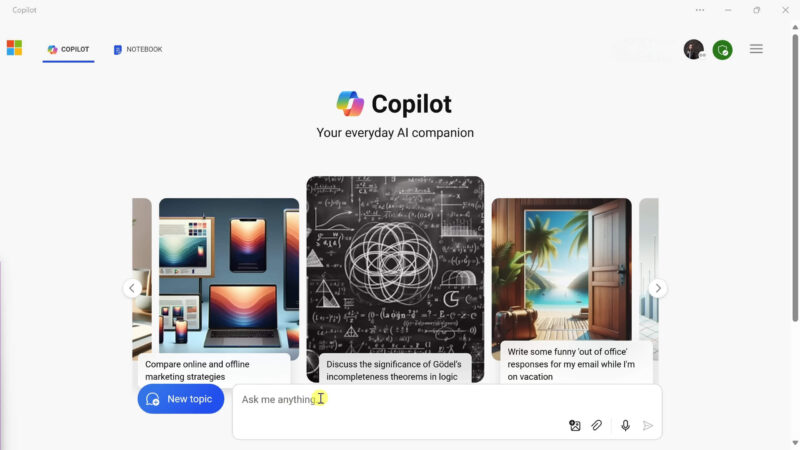
| Developer | Microsoft |
| Primary Use | Productivity enhancement |
| Integration | Microsoft Office Suite |
| Languages Supported | Multiple |
| Availability | Global |
Microsoft Copilot is an AI assistant designed to enhance productivity by integrating seamlessly with the Microsoft Office Suite. It offers support for document creation, emails, data analysis, and more, making it an invaluable tool for professionals who rely on Microsoft’s ecosystem.
One of the standout features of Microsoft Copilot is its deep integration with Microsoft Office products. This allows users to perform complex tasks within familiar applications like Word, Excel, and Outlook. From generating content to analyzing data, Copilot can help streamline workflows and improve efficiency.
All of these great features make this platform one of the best ChatGPT alternatives.
Pros and Cons
| Pros | Cons |
|---|---|
| Seamless integration with Microsoft Office | Limited to Microsoft environments |
| Enhances productivity | Requires Microsoft subscription |
| Supports multiple languages | Primarily geared towards business use |
| Continuous updates | Less focus on creative tasks |
4. Hugging Face
| Developer | Hugging Face Inc. |
| Primary Use | Natural Language Processing |
| Integration | Customizable API and models |
| Languages Supported | Multiple |
| Availability | Global |
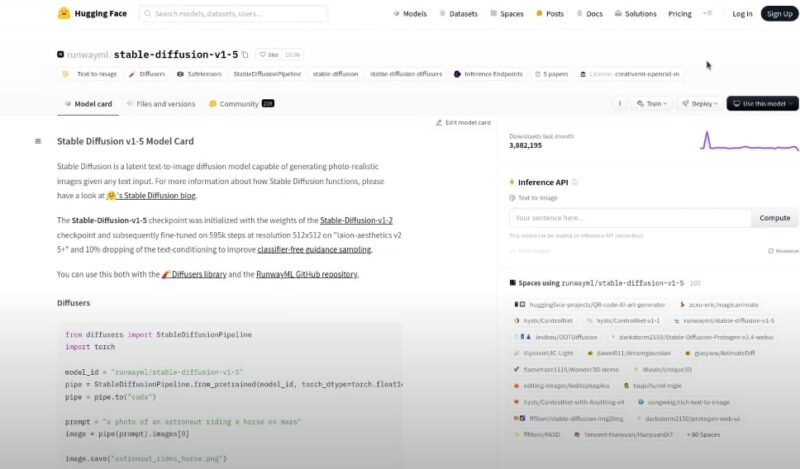
Hugging Face is an open-source platform known for its advanced models and transformers for natural language processing (NLP). It offers a wide range of tools for developers and researchers to build, train, and deploy state-of-the-art NLP models.
Hugging Face stands out due to its highly customizable API and the extensive library of pre-trained models available on the platform. This makes it an excellent choice for those with technical expertise looking to create tailored NLP solutions. From sentiment analysis to language translation, Hugging Face provides the necessary resources to tackle various NLP tasks.
The platform supports multiple languages and continuously updates its models to reflect the latest advancements in the field. Its open-source nature allows for community contributions, ensuring a diverse and dynamic set of tools and resources.
Pros and Cons
| Pros | Cons |
|---|---|
| Highly customizable API | Requires technical knowledge |
| Extensive library of pre-trained models | Can be complex to set up |
| Open-source and community-driven | Less user-friendly for non-technical users |
| Continuous updates | Dependent on internet connectivity |
5. Replika
| Developer | Luka, Inc. |
| Primary Use | Companionship and mental health support |
| Integration | Standalone app |
| Languages Supported | English |
| Availability | Global |
Replika is an AI chatbot designed to provide companionship and mental health support. It is built to engage users in deep, meaningful conversations, helping them explore their thoughts and feelings in a safe and supportive environment. Replika’s primary goal is to offer emotional support, making it a valuable tool for individuals seeking a virtual friend.
One of the unique aspects of Replika is its ability to learn from interactions, becoming more personalized and effective over time. This AI companion can help users manage stress, anxiety, and loneliness by offering a non-judgmental space for conversation. The app is easy to use and accessible, making it a popular choice for those looking to improve their mental well-being.
Replika is available as a standalone app, making it convenient for users to access their AI companion anytime, anywhere.
Pros and Cons
| Pros | Cons |
|---|---|
| Personalized and empathetic responses | Limited to English |
| Focus on mental health and companionship | May not suit professional needs |
| User-friendly app | Can be less useful for technical tasks |
| Continuously learns from interactions | Dependent on internet connectivity |
6. Cleverbot
| Developer | Icogno Ltd. |
| Primary Use | Casual conversation and entertainment |
| Integration | Web-based and mobile apps |
| Languages Supported | Multiple |
| Availability | Global |

Cleverbot is an AI chatbot known for engaging users in casual conversations and providing entertainment. It has been a popular choice for those looking to chat with an AI that can mimic human-like responses. Cleverbot learns from its interactions with users, improving its conversational abilities over time.
Cleverbot is accessible via its website and mobile apps, making it easy for users to start a conversation from anywhere. It supports multiple languages, allowing a wide range of users to interact with it. The primary appeal of Cleverbot lies in its ability to provide entertaining and sometimes surprising responses, making it a fun tool for casual chatting.
While Cleverbot excels in casual conversation, it may not be the best choice for professional or technical tasks.
If you are looking for a simple tool, Cleverbot is the best among ChatGPT alternatives.
Pros and Cons
| Pros | Cons |
|---|---|
| Engaging and entertaining responses | Not suitable for professional use |
| Accessible via web and mobile apps | Responses can be unpredictable |
| Supports multiple languages | Limited to casual conversations |
| Continuously learns from interactions | Dependent on internet connectivity |
7. IBM Watson Assistant
| Developer | IBM |
| Primary Use | Customer service and enterprise solutions |
| Integration | Enterprise systems and APIs |
| Languages Supported | Multiple |
| Availability | Global |

IBM Watson Assistant is a powerful AI developed by IBM, tailored for customer service and enterprise solutions. It is designed to help businesses automate their customer interactions, providing quick and accurate responses to user queries. Watson Assistant integrates seamlessly with various enterprise systems, making it a robust tool for large organizations.
One of the key strengths of IBM Watson Assistant is its ability to handle complex queries and provide detailed, contextually relevant responses. It can be customized to fit specific business needs, whether for customer support, virtual assistants, or information retrieval. Its advanced AI capabilities ensure that interactions are smooth and efficient, enhancing customer satisfaction.
Pros and Cons
| Pros | Cons |
|---|---|
| Enterprise-level integration | Geared towards business use |
| Advanced AI capabilities | Can be complex to implement |
| Customizable to specific needs | Higher cost for enterprise solutions |
| Supports multiple languages | May be overkill for small businesses |
8. Chai
| Developer | Chai Research Corp. |
| Primary Use | Conversational AI experiences |
| Integration | Standalone app and web platform |
| Languages Supported | Multiple |
| Availability | Global |
Chai is a versatile AI platform offering a wide variety of conversational experiences through its chatbots. It is designed to cater to different user needs, from casual chats to more specialized interactions. Chai aims to provide an engaging and user-friendly experience, making it a popular choice for those seeking diverse conversational AI interactions.
The platform is accessible via both a standalone app and a web platform, allowing users to interact with various chatbots seamlessly. Chai supports multiple languages, broadening its user base and making it accessible to a global audience. The platform continuously evolves with user feedback, ensuring that the chatbots remain engaging and effective.
Chai’s strength lies in its variety of chatbots tailored for different purposes.
Pros and Cons
| Pros | Cons |
|---|---|
| Wide variety of chatbots | Quality of responses can vary |
| Accessible via app and web platform | Not focused on professional use |
| Supports multiple languages | Dependent on user feedback for improvement |
| User-friendly interface | Responses may not always be accurate |
9. OpenAI Codex
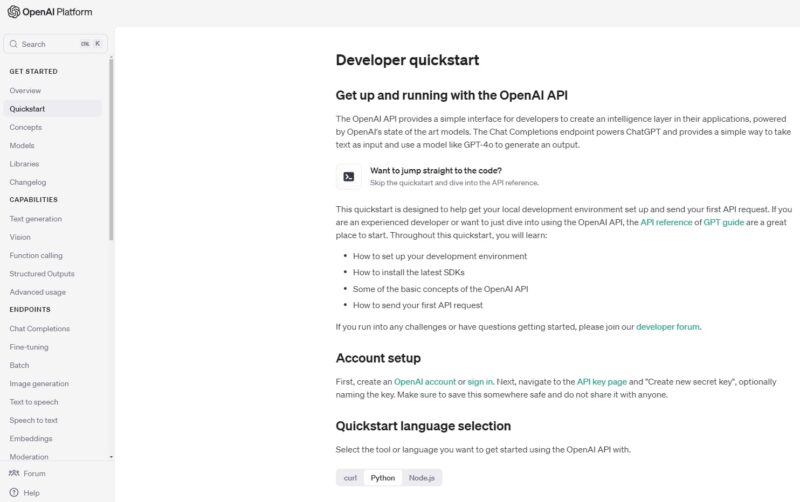
| Developer | OpenAI |
| Primary Use | Coding assistance |
| Integration | Various coding environments and IDEs |
| Languages Supported | Multiple programming languages |
| Availability | Global |
OpenAI Codex is a specialized AI developed to assist with coding tasks. It supports multiple programming languages and integrates with various coding environments and integrated development environments (IDEs), making it a valuable tool for developers looking to enhance their productivity and coding efficiency.
Codex excels at generating code snippets, debugging, and providing code recommendations, which can significantly speed up the development process. It understands natural language prompts, allowing developers to describe what they need in plain English and receive relevant code suggestions. This feature makes Codex particularly useful for both experienced developers and those new to programming.
The AI is continuously updated to support the latest programming languages and frameworks, ensuring that it remains a cutting-edge tool for coding assistance.
And those who are looking for a more advanced platform, this one surely is the best among ChatGPT alternatives.
Pros and Cons
| Pros | Cons |
|---|---|
| Supports multiple programming languages | Primarily focused on coding tasks |
| Generates code snippets and recommendations | May require fine-tuning for complex tasks |
| Integrates with popular IDEs | Dependent on accurate natural language prompts |
| Continuously updated | Less useful for non-coding tasks |
10. YouChat
| Developer | You.com |
| Primary Use | Conversational search and information retrieval |
| Integration | You.com search engine |
| Languages Supported | Multiple |
| Availability | Global |
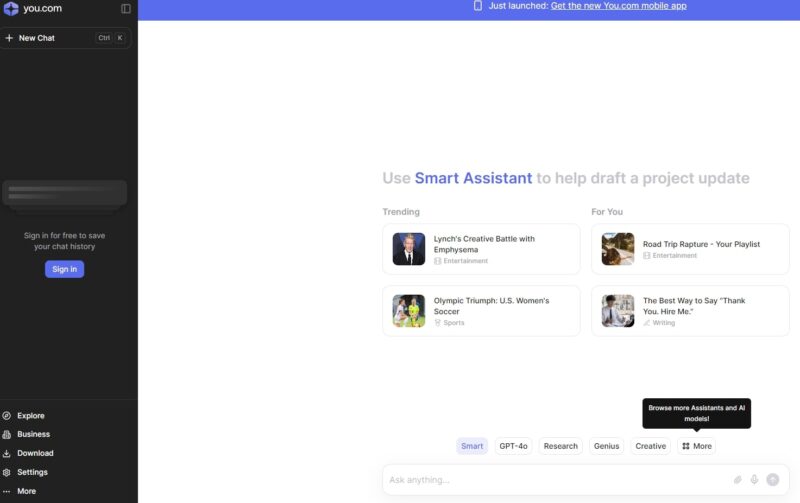
YouChat is an AI assistant integrated into the You.com search engine, designed to enhance the search experience by providing conversational interactions and real-time information retrieval. It aims to make searching for information more interactive and user-friendly, allowing users to ask questions and receive detailed answers in a conversational format.
YouChat leverages the capabilities of the You.com search engine to deliver accurate and up-to-date information on a wide range of topics. It supports multiple languages, making it accessible to users around the world. This integration ensures that users can not only perform traditional searches but also engage in a more dynamic and intuitive search experience.
The primary advantage of YouChat is its ability to understand and respond to natural language queries, making it easier for users to find the information they need without having to use specific search terms.
Pros and Cons
| Pros | Cons |
|---|---|
| Conversational search experience | Still evolving |
| Accurate and up-to-date information | Limited to the You.com ecosystem |
| Supports multiple languages | May not be as comprehensive as traditional search engines |
| User-friendly interface | Dependent on internet connectivity |
FAQs
How do AI chatbots handle customer data privacy and security?
AI chatbots implement various measures to protect customer data during interactions. This includes encryption, secure data storage, and compliance with data protection regulations such as GDPR. Ensuring data privacy is crucial, especially when handling sensitive information in industries like finance and healthcare.
Can AI chatbots be customized for specific business needs?
Yes, many AI chatbots offer customization options to meet specific business requirements. This includes integrating with existing systems, customizing conversation flows, and tailoring responses based on business rules and customer data. Platforms like IBM Watson Assistant and Botsify provide extensive customization capabilities to suit different industries and use cases.
How do AI chatbots learn and improve over time?
AI chatbots use machine learning algorithms to learn from interactions. They analyze user inputs and feedback to improve their responses. Over time, this continuous learning process helps the chatbot become more accurate and effective in handling queries. Regular updates from developers also enhance their capabilities.
What are the typical costs of using AI chatbots?
The cost of using AI chatbots varies depending on the platform and the features required. Some chatbots offer free basic versions with limited features, while advanced functionalities come with subscription plans. For instance, Jasper’s plans start at $39/month, while advanced enterprise solutions like Drift can cost up to $2500/month.
How do AI chatbots integrate with other software?
AI chatbots often provide APIs and support for integration with various software systems. This allows them to connect with CRM systems, helpdesk software, and other business tools to streamline workflows and improve efficiency. Platforms like Microsoft Copilot and Zendesk Chat offer seamless integration with popular business applications.
Can AI chatbots handle multilingual support?
Yes, many AI chatbots support multiple languages, making them accessible to a global audience. They can understand and respond to queries in different languages, which is essential for businesses operating in diverse markets. Chatbots like IBM Watson Assistant and Ultimate offer robust multilingual support, enhancing their usability across different regions.
Last Words
Choosing the right AI chatbot can greatly enhance your productivity, customer engagement, and overall experience with technology. With various options tailored for different needs, it’s important to understand the unique features and benefits each one offers.
By exploring the best ChatGPT alternatives, you can find the perfect tool to meet your specific requirements and leverage the full potential of AI chatbots.


